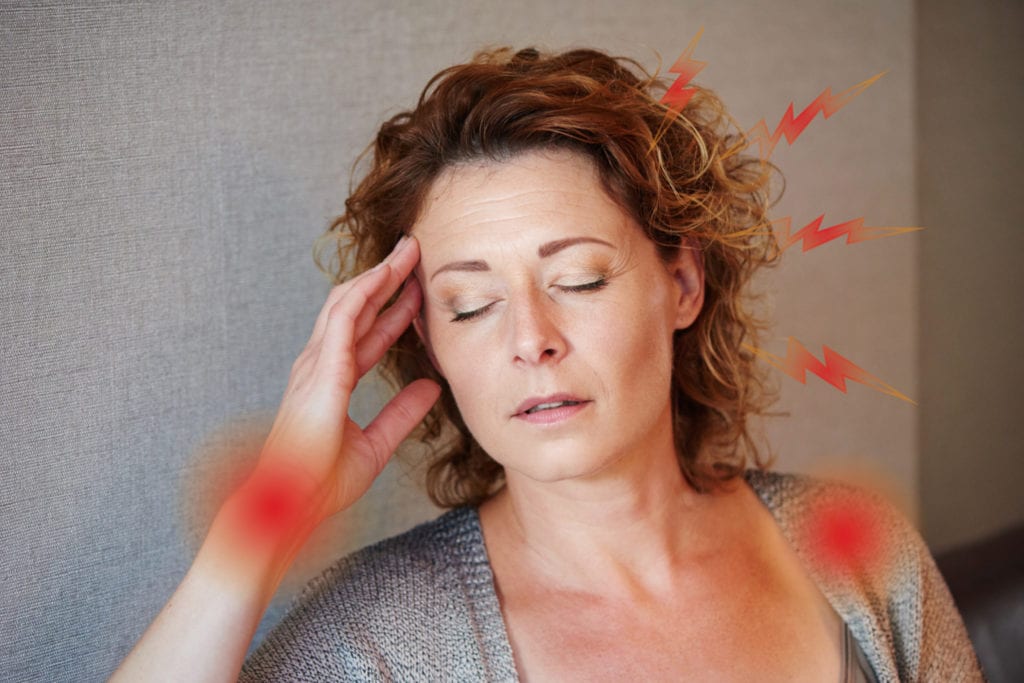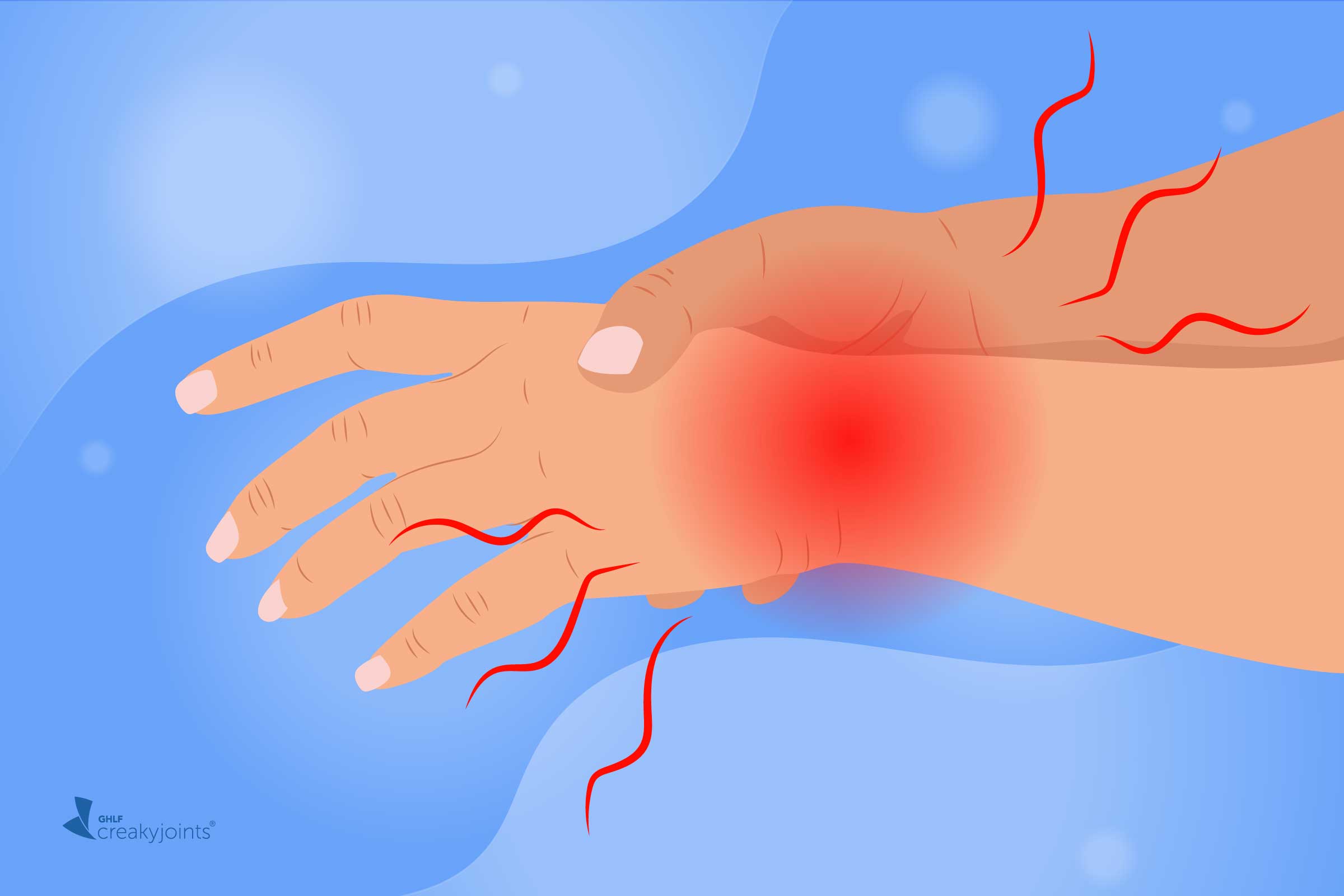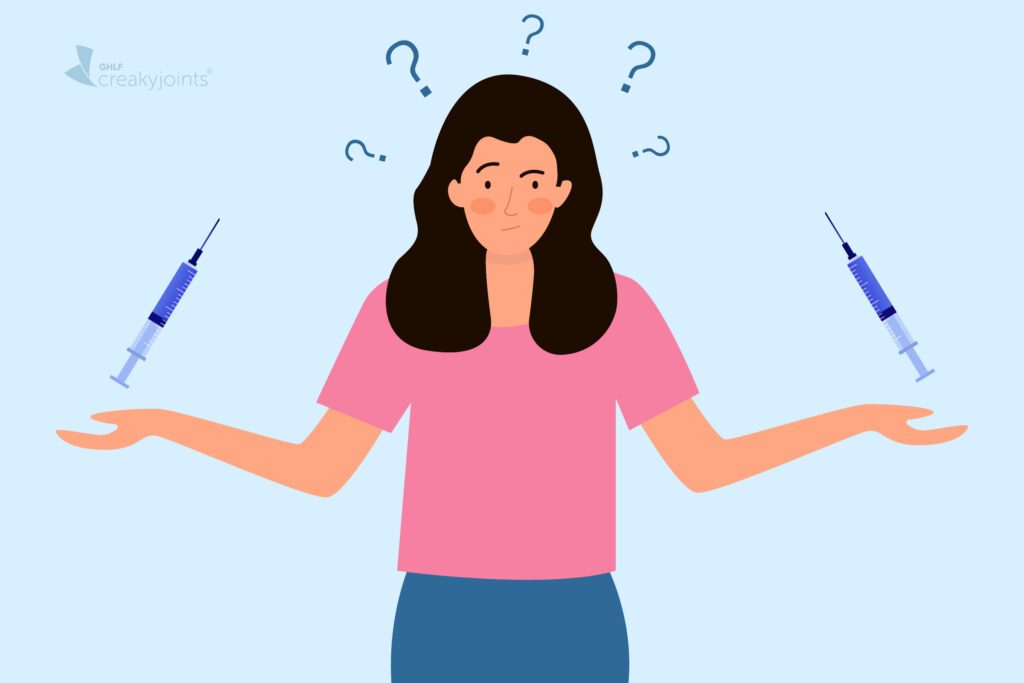

Rheumatoid arthritis (RA) can be tough enough on its own: joint pain, stiffness, swelling, and fatigue take a toll on your health — both physically and emotionally. Add menopause into the mix —with its hot flashes, sleep disruption, mood swings, vaginal dryness, and more — and one CreakyJoints member calls the combination a “nightmare.”
“When a woman is already living with the symptoms of a chronic illness like RA, it may make for an even more difficult menopausal transition,” says Elizabeth Mollard, PhD, assistant professor at the University of Nebraska Medical Center College of Nursing. It’s a statement that patient Ranay Collins can attest to firsthand. “Menopause has definitely been impacting my RA,” she shared on a CreakyJoints Facebook post. “It’s harder to sleep, exhaustion is more frequent, and pain seems harder to tolerate.”
Why Menopause Might Make Your RA Worse
Experts don’t know for sure, but some research suggests hormones may play a role. Studies have shown that women with RA experience shifts in their disease activity when hormone levels change. During pregnancy (when estrogen levels increase), women have seen RA symptoms improve, yet after giving birth (when hormones levels drop), there’s an increased incidence of the disease development or RA flare-ups.
Enter menopause, when estrogen levels plummet. According to a 2012 study, women who go through early menopause are more likely to develop RA compared to those who experience normal to late menopause.
Menopause, a natural body process that marks the end of a woman’s menstrual cycles, has also been shown to worsen RA symptoms. In a recent observational study published in the journal Rheumatology, researchers looked at the functional status of 8,189 women with RA. Their findings indicated menopause had a significant impact on the level and rate of functional decline and was associated with a worsening progression of RA symptoms.
While it seems that estrogen may have a protective effect for RA, more research is needed. “Looking at estrogen alone neglects the extensive immune system and the complex changes that women experience at menopause,” says Dr. Mollard, who co-authored the study.
Michael Lockshin, MD, rheumatologist at Hospital for Special Surgery in New York City, agrees: “One of the puzzles about rheumatoid arthritis and other autoimmune diseases is that are differences between pre- and postmenopausal patients,” he explains. “What is not clear is if these differences are due to estrogen, to other non-estrogen factors of menopause, or to other phenomena of aging.”
What we do know is that for some women, the combination of menopause and RA can be challenging. “For the healthiest women, menopause symptoms can be very disruptive,” says Dr. Mollard. Adding those to the already trying symptoms of RA, like pain and fatigue, could lead to a decreased quality of life. “Both RA and menopause can negatively affect mood and sleep,” she adds, “so together the menopausal woman with RA will likely have compounded symptoms.”
How Menopause and RA Affect Comorbid Conditions
Osteoporosis
Menopause raises your risk of osteoporosis — a condition that’s already more likely to affect people with RA. Osteoporosis causes bones to become weak and brittle, making them more prone to fractures. In rheumatoid arthritis, bone loss may occur as a direct result of the disease itself, as well as from medications used to treat the disease.
Cardiovascular Disease
Cardiovascular disease is another potential complication of both menopause and rheumatoid arthritis. It’s one of the leading causes of death for women with RA, says Dr. Mollard. Inflammation from RA not only attacks your joints but can also damage the heart. Hormonal changes and increasing age after menopause can increase your risk of heart problems as well. “Women with RA will have a greater risk for heart disease after menopause than women without RA or women with RA who are premenopausal,” explains Dr. Mollard.
This may mean your preventive care needs to change. Your doctor may want you to start seeing a cardiologist if you’re not already, monitor you for signs of heart disease more frequently, and use more aggressive treatment if needed.
How to Help Ease Menopause Symptoms and Stay Healthy
Step one: Stick to your RA treatment plan and work closely with your doctor to help keep the disease under control. “Treating rheumatoid arthritis aggressively — minimizing all signs of inflammation — is the best option,” advises Dr. Lockshin. “The more aggressively you treat RA, the less cardiovascular disease occurs.”
Some research suggests women do have improved well-being on estrogen hormone therapy, says Dr. Mollard, but the risks — such as increased cardiovascular disease or breast cancer risk — can outweigh the benefits for many patients. Current recommendations are to consider hormone therapy only to relieve severe menopausal symptoms, says Dr. Lockshin; not secondary effects, such as rheumatoid arthritis control.
Instead, women with RA should consider menopause “a call to action to live your healthiest life,” says Dr. Mollard. Eat healthy, exercise more, and quit smoking to help keep your heart healthy and help manage both RA flares and hot flashes. Yoga may help ease symptoms, according to a CreakyJoints member; so might meditation.
Here are more specific strategies to ease symptoms and boost health:
1. Exercise regularly
The list of reasons is long: physical activity can help keep your bones strong and joints flexible; it can keep your heart healthy; it can help fight fatigue, improve your mood, help you sleep better, and boost overall health. Talk to your doctor to determine when exercises are safest for you.
2. Boost your calcium and vitamin D intake
Both are essential in building strong, dense bones. Low-fat dairy, dark leafy greens, and canned salmon or sardines are good sources of calcium; vitamin D is found in fatty fish like wild-caught mackerel, salmon, and tuna, and it’s added to milk and other dairy products, orange juice, and fortified cereals. Ask you doctor if a calcium or vitamin D supplement is right for you. (Here are other supplements doctors often recommend for arthritis.)
3. Get your bone density measured
It’s a simple test that uses low levels of X-rays to determine the proportion of mineral in your bones. In most cases, only a few bones are checked — usually in the hip, wrist, and spine, according to the Mayo Clinic. If you have low bone mineral density, your doctor may recommend bone-building medication (such as a drug in the bisphosphonate class).
4. Keep your bedroom cool, dark, and quiet
Menopause-related night sweats can make it tough to get a good night’s rest. And, in a vicious cycle, lack of sleep can make the pain and fatigue of RA worse. Dress in light pajamas to help you stay cool and use layered bedding that can easily be removed at night. And to help you fall asleep faster:
- Stick to a regular sleep schedule
- Avoid heavy meals, caffeine, and alcohol too close to bedtime.
- Don’t watch TV in the bedroom, and turn off or dim the light on your cell phone.
- Wind down before sleep by reading a book, listening to music, or taking a warm bath.
5. Talk openly about sex
RA can sometimes make it tough to maintain a healthy sex life. Pain and fatigue can dampen desire, and some women with inflammatory arthritis may develop another immune disorder that decreases lubrication, making intercourse uncomfortable. Menopause, too, can also lead to vaginal dryness and a decline in sex function.
Talk to your doctor about the sexual health problems you’re experiencing. In some cases, you could try different medications to minimize side effects that affect libido. You may also need to start using lubrication to make sex less painful. And be honest with your partner about your needs and feelings — being direct can help him or her better understand your challenges. Here’s more advice from a psychologist on how to talk about sex with your partner.





